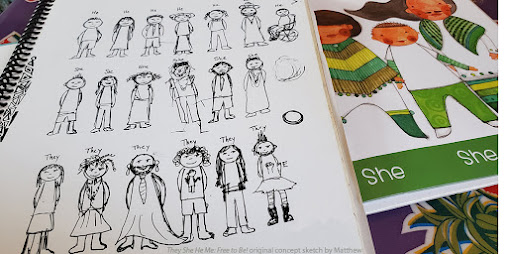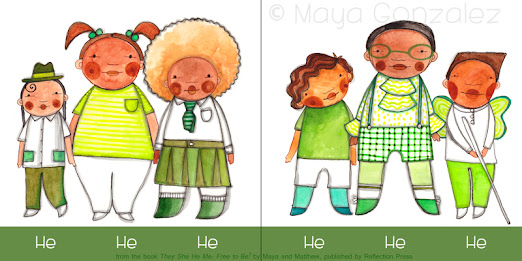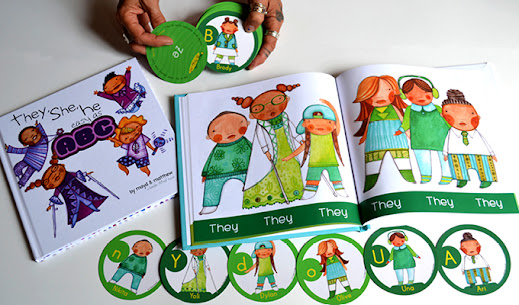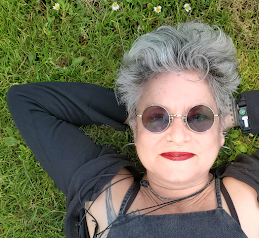One Book's Mission to Defy the Status Quo
Everything changes when you become a parent. All your beliefs and ideals come to call, along with memories of your own childhood. It can be a lot to navigate a new baby on top of all the gender assumptions that start piling on. This can be especially challenging if you’re a queer/trans parent.
“He’s a little man, she’s a pretty princess,” can be overwhelming on so many levels.
Those first few years my partner and I did our best, but by the time our kid turned 4, we had to get real for real.
Gender policing was coming in hot and heavy. We were seeing kids that we had known for years on the playground and in classes suddenly shutting down and adopting “appropriate gender roles.”
It was all a bit mind boggling, especially in San Francisco’s Castro district, a historically gay neighborhood. If it was happening here, how could we meet the incoming ocean of assumptions and stereotypes that lie beyond our city!?!? What’s more, how could we talk to our kid about it?!?
My partner started using pronouns to interrupt the constant stereotypical gender messaging our kid was being served. For example, he would reference 6 different people from feminine to masculine who all used the same pronoun. Rigid ideas about “SHE wears this and looks like this” and “HE wears this and looks like this” started to melt away. It was a constant practice, but without a lot of complicated talk, our kid deepened their understanding of how to treat a person like a person without gender overlays.
 |
| Original concept sketch by Matthew (with a little help from our then 4 year old) |
In 2017, we published the first gender-inclusive pronoun book for kids, They She He Me: Free to Be!. We were actively using pronouns to break down assumptions with our kid at home and it was working beautifully. We put a lot of support and language in the back of the book to show adults how to talk to kids about it.
The trick with any book, of course, is how does it translate into the current culture? Home culture is often very different than school, work, grocery store, church or family event culture…
We weren’t encouraging our kid to ask for pronouns. We actively used a formal singular they or a person’s name. Personal pronouns became just that. Something personal. You learned pronouns through getting to know someone personally. More than anything this takes the pressure off of gender nonconforming kids to come forward with their pronoun in pubic or educational settings, either when no one else was, or when other people did and their pronouns did not interrupt gender assumptions.
 |
| Sample spread from They She He Me: Free to Be! |
There’s zero risk when someone shares their pronouns and they fulfill assumptions. There’s potentially nothing but risk when someone shares their pronouns and they do not fulfill assumptions. As Queer/Trans parents of a nonbinary kid, we were acutely aware of this power dynamic and wanted to create a dynamic that could support our kid not just now, but throughout life.
 |
| Sample spread from They She He Me: Free to Be! |
When I realized our pronoun book was often being framed as a way
to ask for pronouns, instead of address and break down the underlying
stereotypes attached to pronouns, I was concerned.
I appreciate that any kind of progress is being made for Queer/Trans people in our society, but sharing and asking for pronouns is a slippery slope. It lays all the responsibility, pressure and emotional work on Queer/Trans people, including kids, to come forward and often be vulnerable.
Sometimes QueerTrans people are not ready to share their pronoun and are forced to mispronoun themselves and also give others permission to mispronoun them. Sometimes they are still discovering, are in a time of flux or even fluid. Sometimes it’s not a fully safe environment. Sometimes it’s not anyone else’s business. No matter the reason, a one size fits all of asking for pronouns has gotten into place. In fact, it has become a signal of safe space, but it isn’t always, especially for kids. Sharing pronouns doesn’t fundamentally change assumptions. In fact, a person’s assumptions could potentially remain fully intact.
In 2019 we took our pronoun kids from the book, gave them names that followed the alphabet and made an educational card deck. We wanted to create more reflection and hoped that actually playing with 52 gender nonconforming kids on upper and lower case letters would make understanding gender diversity even more accessible. A lot of what we learned about gender we share in the mini support deck, including what we call the Pronoun Protocol.
The cards are not about learning more pronouns or the importance of pronouns. Pronouns are how we use language to translate ourselves into the culture. They’re valuable. But if we’re after real respect and lasting change, we have to go deeper. We need to deal with the assumptions that are tied to pronouns, which means being able to see those assumptions.
The Playing with Pronouns card deck helps us notice how we all make assumptions about who people are, even who people get to be based on their body assignment at birth or how they look or act or dress or even what pronoun they use.
For kids it means staying open and curious. For adults it means looking at how we have been taught to categorize people and have discomfort with the unknown. It means looking at ourselves and what gender assumptions we fulfill. Were these conscious choices? Or were we unconsciously corralled into place? Are we doing that to kids?
Lasting change means taking responsibility for the assumptions we’re taught and how we perpetuate them inside and out. Are we ready to let people be exactly who they are without knowing what pronoun they use? Because as much as pronouns matter, what matters more is everyone feeling respected and perfectly free to be exactly who they are all the time no matter what. I want that for my kid. I want that for me. I want that for everybody.
They She He Me: Free to Be! is still twisting and turning through the culture. There are now a plethora of pronoun books. It has been a tornado of a ride and we’re still not done.
All I know at the end of the day is that learning to treat each other like people instead of gender roles is a huge leap into a new world. It’s a lot more than pronouns and I’m ready for it!
Let’s heal deeper and be freer this Pride!
Learn more about the card deck: www.playingwithpronouns.com
Maya Gonzalez is an award-winning children’s book artist, author, activist and progressive educator. Maya's work addresses systemic inequity in relation to race/ethnicity, sexism and cissexism using children’s books as radical agents of change and healing, both personally and culturally. Maya co-founded Reflection Press, a POC, queer and trans owned independent publishing house that uses holistic, nature-based, and anti-oppression frameworks in their books and materials for kids and grown-ups. Maya is also the creator of the Gender Wheel, a tool to express the dynamic, infinite and inclusive reality of gender, and provides lectures and workshops to educators, parents and caregivers.
Website: www.mayagonzalez.com
Instagram: @mzmayagonzalez and @genderwheel





No comments:
Post a Comment